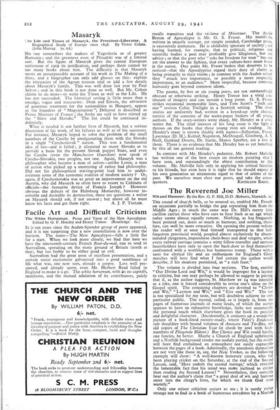Facile Art and Difficult Criticism
The White Horseman. Prose and Verse of the New Apocalypse. Edited by G. F. Hendry and Henry Treece. (Routledge. 6s.)
IT is ten years since the Auden-Spender group of poets appeared, and it is not surprising that a new constellation is now over the horizon. The name—The New Apocalypse—falls a little flat for a start. When we look more closely, we find that here we have the nineteenth-century French Fleur-du-mal, run to seed in Surrealism, sprouting on the stony ground of Britain (north at that), but too feebly to be either good or evil.
Surrealism had the great asset of excellent presentation, and a certain social excitement galvanised into a good semblance of life what was, one now sees, already a corpse. Less well pre- sented, and already spent, even Mr. Herbert Read failed in England to make it a go. The white horseman, with its no capitals, manifesto, and the mutual adulation of its contributors, palely recalls transition and the reclame of Minotaur. The Andre Breton of Apocalypse is Mr. G. S. Fraser. His manifesto, written in smartly corrupt, yet simple minded, Cambridge prose, is excessively immature. He is childishly ignorant of society ; not having learned, for example, that to political, religious and scientific bodies a poet may profitably give 'allegiance, but not advice ; or that the poet who " asks for freedom for man" has not yet the answer to the Sphinx, that every culture-hero must know at the outset. One point Mr. Fraser makes that deserves to be noticed—that the Apocalyptics regard their duty of clarity as being primarily to their vision ; in contrast with the Auden school they " attach less importance, or possibly a more respectful importance, to an audience." More respectful, because common humanity goes beyond common idiom.
The poems, by five or six young poets, are not outstandingly obscure or otherwise striking. Henry Treece has a vivid con- tinuum of imagery and can sustain a long poem. G. S. Frazer strikes occasional memorable lines, and Tom Scott's " loch and star " revives Celtic Twilight in a Scottish setting. The short stories are uniformly bad, written in a keyed-up style charac- teristic of the contents of the waste-paper baskets of all young authors. If the story-writers write sharp, Mr. Hendry as a cribc writes flat. The chief interest of his long essay is the light it throws on the books that these young men are reading. Mr. Hendry's essay is strewn thickly with names—Sallustius, Freud, Lawrence (D. H.), Kolnat, Napoleon, McDougall, Ginsberg, A. S. Neill, Gutkind Doutte, Dr. Suttie, Manes Sperber, are a few of them. There is no evidence that Mr. Hendry has as yet benefited by this all too general reading.
In contrast with Mr. Hendry's pedantry, Mr. Robert Melville has written one of the best essays on modern painting that I have seen, and outstandingly the ablest contribution to this volume. Mr. Melville fails only in applying his critical faculties to his friends, but even here it is right that he should expect of his own generation an attainment equal to that of artists of the past. We ourselves must elect our peers, and take the conse-


































 Previous page
Previous page